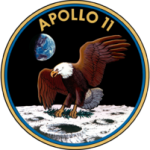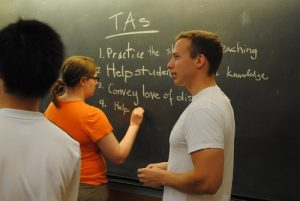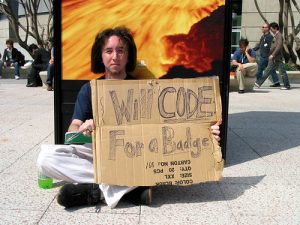This page is out of date. A new version is now available.
As of 2014, Orbital students will receive feedback from their peers but also from Orbital advisors (not to be confused with industrial mentors, as discussed on this page). Mentorship still remains one of the best ways for advanced students in Orbital to reach their maximum potential.
 With the advanced level of difficulty in Orbital (Apollo 11), teams have the option of choosing to be advised by a mentor on their project. Mentors can come from the School in the form of senior students, but also be external guests from industry that represent key companies in industry and local start-ups.
With the advanced level of difficulty in Orbital (Apollo 11), teams have the option of choosing to be advised by a mentor on their project. Mentors can come from the School in the form of senior students, but also be external guests from industry that represent key companies in industry and local start-ups.
Mentorship is only available for those teams that opt to undertake the advanced, Apollo 11, form of Orbital, which emphasizes helping peers, user and software testing and documentation, in addition to having a completed (hopefully functional) prototype project. Teams opting for mentorship must complete Orbital, they may not drop from the programme partway; this is because mentorship involves the mentor who has sacrificed his/her time to mentor the team. Teams that fail to achieve the advanced certification will fail Orbital, and will not earn certification for Orbital even if they have achieved enough milestones that would ordinarily qualify the team for beginner (Восто́к) or intermediate level certification (Project Gemini).
This page details the responsibilities for both mentors as well as mentee teams. Teams and mentors should read both descriptions to be in sync with each others’ expectations.
Mentor matching
After obtaining preferences from both prospective mentors and mentees, the Orbital staff will reconcile and propose prospective mentorship teams (a Orbital team and mentor pairing). These prospective mentorship teams are not yet binding — the team and mentor need to agree on their undertaking formally in email. Once agreed upon, the below commitments are made:
Mentors

Mentors are obligated to make themselves available to the mentee teams, via any form of contact that is mutually agreed on by the teams. This can include face to face meetings, virtual synchronous meetings (i.e., Skype, IM) or simply by email. Nominal, minimal time for mentorship should average one hour a week (13 hours of total time, as Orbital is 13 weeks long). However, mentors are encouraged to interact more with the student teams if they would like.
Mentors should provide guidance to the team in the form of pointers or advice on what technology stacks, libraries or projects are suitable for the team’s skill level. Mentors are allowed to influence the project idea, scope, and execution — ideally, they should be vested parties in the idea of the project itself and be passionate about the teams idea.
Mentors should not be answering detailed, technical questions about projects. Orbital is a self-directed independent project, and as such, student teams need to display initiative to figure out these difficulties on their own.
Mentors should also not obligate students to perform tasks that are beyond the scope of the project directly. It is expected that mentors and mentees form a good working relationship that may transcend the Orbital project, but for the purposes of Orbital, mentorship should only involve advice and direction directly affecting the team’s project and its evaluation.
Mentors are not formally evaluated, but mentors who are evaluated by their teams as not performing their meeting and advisement duties will be reconsidered for invitation in the next Orbital iteration.
Mentors are welcomed to help the general Orbital cohort by helping to answer questions brought up in the Piazza forum (for the 2014 cohort) and on Askbot (for the previous 2013 cohort). Contact the facilitators for a login to Piazza.
Mentee Teams

By agreeing to be mentored, mentee teams are making a serious commitment to try to complete Orbital’s advanced certification. Mentors will normally be giving advice about the overall strategy for the project, especially technical advice about pointers to technologies or general troubleshooting (however, detailed technical bug fixing problems are generally the responsibility of the student groups themselves), but may be approach to give advice on other non-technical (soft skills) advice such as giving feedback, project presentation and report writing.
Mentees have the responsibility of continually updating and meeting with their mentors about their project progress. Mentors that feel that their mentee teams are not contributing enough towards meeting the advanced certification may feed back to the Orbital staff for close monitoring.
